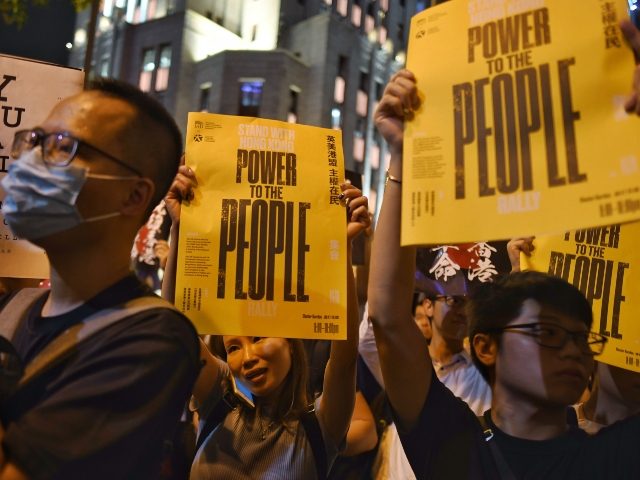Hong Kong’s wealthiest man, Li Ka-shing, bought multiple front-page newspaper ads Friday encouraging protesters to “love China” and “love [the] rule of law.”
The 91-year-old also apparently paid a man known as the “French Spider-Man” to unfurl a large red banner showing a unified Chinese communist and Hong Kong flag and two hands shaking.
Li’s front-page ads used cryptic language to discourage Hong Kong residents from protesting against the repressive communist state, as they have been doing by the millions since early June. The ad featured the Chinese character for the word “violence” crossed out by a red circle and the message, “the best intentions can bring the worst results, cease the anger with love,” according to a translation by the Hong Kong Free Press (HKFP).
“Love China, love Hong Kong, love oneself; love freedom, love empathy, love rule of law,” the ads read.
Another version of the ad alluded to a Tang dynasty poem, reading, “the melon of Huangtai cannot bear the picking again,” the South China Morning Post translated. In the poem, a Tang dynasty crown prince warns that picking too much fruit off of a healthy melon tree can kill it; Li appears to be warning that Hong Kong protesters demanding too much freedom from the Communist Party may end up killing off Hong Kong entirely.
On the same day that Li published the ads, Alain Robert, a famous skyscraper climber, hoisted a flag over Li’s Cheung Kong Center building showing the Communist Party flag united with the bauhinia flower in the center of the Hong Kong flag and red and yellow hands in a handshake.
Hong Kong issued a one-year ban on Robert’s extreme climbing almost exactly one year ago Friday.
Li, a businessman that has flourished in the two decades of Chinese rule over the city, issued a statement following the publication of the ads which appeared intended to make him seem neutral and simply asking for peace. He clearly faulted the peaceful protest movement for violence on the streets of the city – instigated by undercover police officers and pro-China mobs – and lectured the protesters.
“We need to cherish ourselves, our identity as a Chinese and a Hong Kong citizen, just as we treasure freedom, empathy and rule of law,” Li’s statement read.
Li’s call for Hong Kong residents to “cherish” being Chinese is significantly out of sync with what Hong Kong residents have insisted in protests and recent surveys. A poll released in late June by the University of Hong Kong, shortly following the eruption of the pro-democracy protests, found that identification with the Chinese communist state is at an all-time low in the city since the United Kingdom handed it over to Beijing. Only 11 percent of those surveyed said they identified as Chinese, less than half of the amount that said they identified as “Hongkongers in China.”
Up to 90 percent of people aged 18-29, and 71 percent of respondents generally, said they were not proud of possessing Chinese citizenship.
The Communist Party has turned to prominent individuals like Li and Chinese celebrities to engage in propaganda against the protests. This week, several popular Chinese rappers – some of whom have faced career consequences in the past for being perceived as deviating from the wishes of the state – began sharing an internet meme on social media created by the People’s Daily, the official newspaper of the Communist Party of China.
“I support Hong Kong police, you can hit me,” the meme reads in Chinese, followed by a sentence in English: “What a shame for Hong Kong.”
Liu Yifei, a Chinese-American actress tapped to play Hua Mulan in the eponymous live-action Disney movie, also shared the meme, leading to the People’s Daily publishing a defensive piece Friday claiming that complying with Beijing was a bold move that has led to criticism.
Hong Kong’s protest movement erupted in early June in response to an attempt by pro-China lawmakers to pass a law that would allow the Communist Party to extradite anyone in the city if deemed to have violated Chinese law. Chinese law is not valid in Hong Kong as per the “One Country, Two Systems” rule, which bars both China from imposing its totalitarianism and Hong Kong from declaring sovereignty.
Hong Kong police responded to the peaceful protests with disproportionate violence, attacking protesters using tear gas and bean bag projectiles, among other anti-riot equipment. Police used so much tear gas to repress protests this month that journalists testified to coughing blood. This past weekend, police disguised as protesters violently beat and arrested peaceful protesters, caught on video shooting a bean bag into a woman’s eye and shattering her face, and shoving another compliant protester into a pool of his own blood.
In response, the protest movement has issued five demands: a full withdrawal of the original extradition bill, freedom for political prisoners, an apology from the government for calling the June 12 peaceful march a “riot,” direct election of lawmakers, and an independent inquiry into police brutality.
On Friday, Hong Kong police issued a statement confirming at least 748 arrests since the movement began in June.
Chinese Communist Party dictator Xi Jinping has yet to issue a statement on the matter.

COMMENTS
Please let us know if you're having issues with commenting.